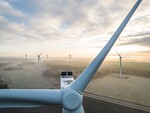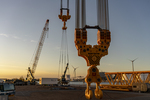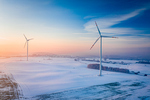05/27/2005
The Dena report - a German study on grid integration of wind energy
The dena report - a German study on grid integration of wind energy - was presented in detail at the international “Conference on the integration of wind energy into the German Electricity Supply” last week in Berlin. On this occasion, EWEA, VDMA Power Systems
and BWE released a wind industry briefing analysing the study’s findings and commenting on the issue. “What is valuable from the European perspective is that in Germany the planned tripling of wind energy to deliver 14 % of the country’s electricity consumption by 2015 is technically feasible and economically very effective”, said Corin Millais, CEO of EWEA. “The reports’ findings are significant for policy makers – can wind power practically deliver an important part of a country’s electricity supply? The answer is yes. It costs little and there are no technical constraints. The opinion that wind energy can’t deliver on a big scale has been blown away” “Depending on the scenario of the price development for fossil fuels, German wind power will be competitive in the next decade on the home market regardless of external costs”, said Thorsten Herdan, Managing Director of VDMA Power Systems. “The alleged costs of grid extension and integration had been exaggerated in the past, the widely discussed necessity of the construction of new balancing power stations is just a myth”, said Ralf Bischof, Policy Director of BWE.
The core results of the study are that:
- Wind energy installations in Germany can expand from almost 17 GW today to 36 GW in 2015 and 48 GW in 2020. Wind energy annual production triples from 23,5 TWh in 2003 to 77,2 TWh in 2015, providing 14 % of the German net electricity consumption.
- Wind energy increases only marginally the cost of electricity for the consumers: The total additional cost caused by tripling wind power production up to 77 TWh in 2015 compared to 2003 is estimated to be between 1.6 and 2.3 Billion € on the basis of minor or no price increases for fossil fuels. For an average household using 3.5 MWh per year the incremental cost due to higher generation costs and increased grid charges would be in the order of 1 € per month.
- Wind energy requires only minor expansion of the grid; Until 2015, an additional 850 km of extra high voltage lines should be built, and another 400 km should be upgraded. This corresponds to a share of 5% of the currently existing extra high voltage line tracks. The corresponding investment is estimated to be 1.1 Billion €. Grid extension alone would increase the electricity cost by 2015 for the consumer by the equivalent of less than 1 € per household per annum.
- Wind energy does not require construction of additional ‘balancing’ power stations; Additional required balancing power can be provided by the existing conventional plants.
- Wind energy can help to maintain the system security of supply even with a very significant percentage of the power supply; Improved grid connection codes issued in 2003 which make use of advanced wind turbine technology, ensure that until 2015 the security of supply can be maintained and supported by the increasing wind power capacity.
The German and the European wind energy sector welcome the main results of the dena grid study. The timeframe beyond 2015 until 2025 will be investigated in further analysis.
Peter Ahmels, CEO of BWE said that “we agree with the study’s overall findings, however some improvements are necessary for a follow up study. Networking optimisation, temperature monitoring and incorporation into the balancing power market have not been taken into account, as well as connection to neighbouring electricity markets e.g. Scandinavia with its hydro power resources”. Herdan concluded that “the quality of advanced turbine technology and the optimisation potential of the grid for the integration of wind energy was not sufficiently analysed in the dena study, this needs to be done now”.
Contact details
EWEA, Corin Millais, +32 499 252 537
VDMA Power Systems, Johannes Schiel +49 172 3133461
BWE, Ralf Bischof, +49 160 97717836
More information: www.dena.de or www.ewea.org
and BWE released a wind industry briefing analysing the study’s findings and commenting on the issue. “What is valuable from the European perspective is that in Germany the planned tripling of wind energy to deliver 14 % of the country’s electricity consumption by 2015 is technically feasible and economically very effective”, said Corin Millais, CEO of EWEA. “The reports’ findings are significant for policy makers – can wind power practically deliver an important part of a country’s electricity supply? The answer is yes. It costs little and there are no technical constraints. The opinion that wind energy can’t deliver on a big scale has been blown away” “Depending on the scenario of the price development for fossil fuels, German wind power will be competitive in the next decade on the home market regardless of external costs”, said Thorsten Herdan, Managing Director of VDMA Power Systems. “The alleged costs of grid extension and integration had been exaggerated in the past, the widely discussed necessity of the construction of new balancing power stations is just a myth”, said Ralf Bischof, Policy Director of BWE.
The core results of the study are that:
- Wind energy installations in Germany can expand from almost 17 GW today to 36 GW in 2015 and 48 GW in 2020. Wind energy annual production triples from 23,5 TWh in 2003 to 77,2 TWh in 2015, providing 14 % of the German net electricity consumption.
- Wind energy increases only marginally the cost of electricity for the consumers: The total additional cost caused by tripling wind power production up to 77 TWh in 2015 compared to 2003 is estimated to be between 1.6 and 2.3 Billion € on the basis of minor or no price increases for fossil fuels. For an average household using 3.5 MWh per year the incremental cost due to higher generation costs and increased grid charges would be in the order of 1 € per month.
- Wind energy requires only minor expansion of the grid; Until 2015, an additional 850 km of extra high voltage lines should be built, and another 400 km should be upgraded. This corresponds to a share of 5% of the currently existing extra high voltage line tracks. The corresponding investment is estimated to be 1.1 Billion €. Grid extension alone would increase the electricity cost by 2015 for the consumer by the equivalent of less than 1 € per household per annum.
- Wind energy does not require construction of additional ‘balancing’ power stations; Additional required balancing power can be provided by the existing conventional plants.
- Wind energy can help to maintain the system security of supply even with a very significant percentage of the power supply; Improved grid connection codes issued in 2003 which make use of advanced wind turbine technology, ensure that until 2015 the security of supply can be maintained and supported by the increasing wind power capacity.
The German and the European wind energy sector welcome the main results of the dena grid study. The timeframe beyond 2015 until 2025 will be investigated in further analysis.
Peter Ahmels, CEO of BWE said that “we agree with the study’s overall findings, however some improvements are necessary for a follow up study. Networking optimisation, temperature monitoring and incorporation into the balancing power market have not been taken into account, as well as connection to neighbouring electricity markets e.g. Scandinavia with its hydro power resources”. Herdan concluded that “the quality of advanced turbine technology and the optimisation potential of the grid for the integration of wind energy was not sufficiently analysed in the dena study, this needs to be done now”.
Contact details
EWEA, Corin Millais, +32 499 252 537
VDMA Power Systems, Johannes Schiel +49 172 3133461
BWE, Ralf Bischof, +49 160 97717836
More information: www.dena.de or www.ewea.org
- Source:
- BWEA, EWEA
- Author:
- Edited by Trevor Sievert, Online Editorial Journalist
- Email:
- press@windfair.net
- Keywords:
- Germany, BWEA, EWEA, Dena report, wind energy, wind power, renewable energy, wind farm, wind turbine, rotor blade, offshore, onshore


























